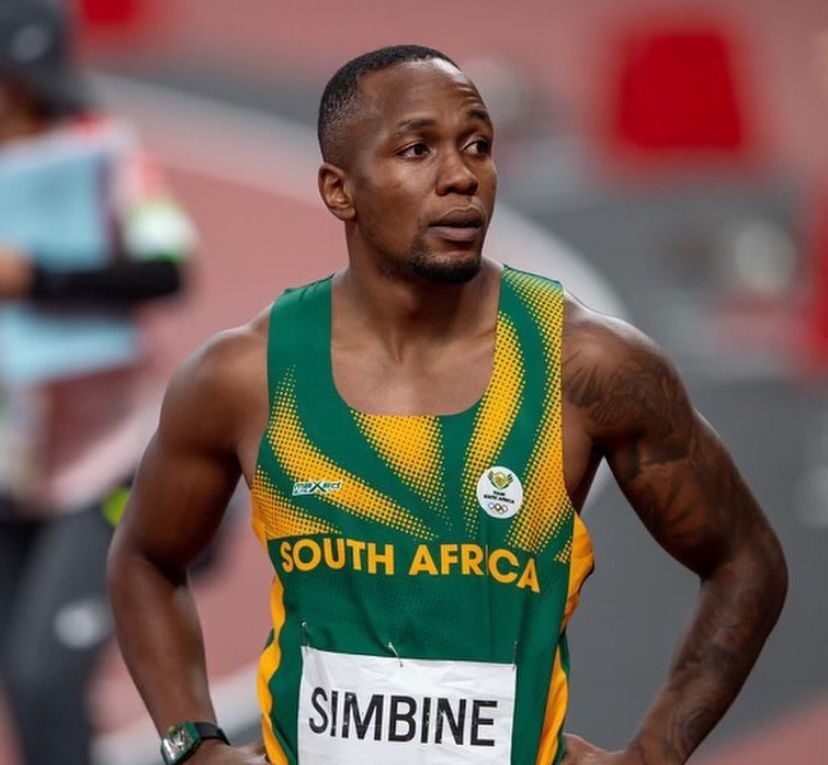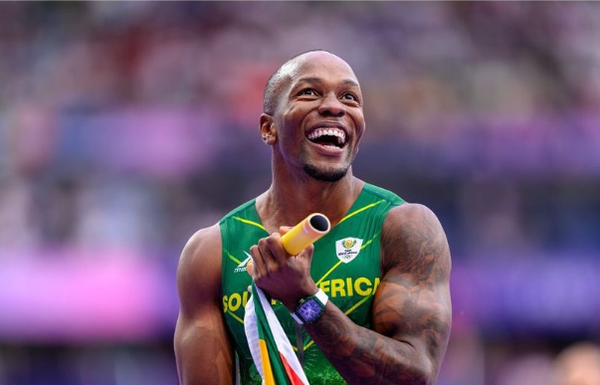

Crowned with quiet confidence and a fierce closing stride, Akani Simbine is writing one of the boldest chapters in track and field this season without needing the fanfare. And then came Guangzhou. A night that will be etched in African sprinting history. In a thunderous display of teamwork and tenacity, South Africa stunned the world by becoming the first African nation to ever clinch gold in the men’s 4x100m at the World Relays, clocking a blistering 37.61 seconds. The moment belonged to Simbine. He hunted down Team USA in the final meters, closing a tight gap and crossing the line a mere 0.05 seconds ahead.
Watch What’s Trending Now!
It wasn’t just a victory; it was a seismic shift in global sprinting. From Xiamen to Shanghai and most recently in Keqiao, Simbine has made a habit of crossing the line ahead of some of the sport’s most celebrated sprinters. Outrunning Olympic silver medalist Kishane Thompson in a neck-and-neck Diamond League thriller, stealing the win by a blink in a photo finish. For Simbine, 2025 isn’t about proving anything to anyone.
It’s about chasing what’s still unfinished. The medals. The moments. And a legacy that he knows is far from complete. A tweet by SuperSportTV perfectly captured the gravity of what Akani Simbine is doing for South African athletics: “And you know the world is going to stop for these 10 seconds just to watch you run.”❤️ It’s more than a poetic statement.
ADVERTISEMENT
"𝗔𝗻𝗱 𝘆𝗼𝘂 𝗸𝗻𝗼𝘄 𝘁𝗵𝗲 𝘄𝗼𝗿𝗹𝗱 𝗶𝘀 𝗴𝗼𝗶𝗻𝗴 𝘁𝗼 𝘀𝘁𝗼𝗽 𝗳𝗼𝗿 𝘁𝗵𝗲𝘀𝗲 𝟭𝟬 𝘀𝗲𝗰𝗼𝗻𝗱𝘀 𝗷𝘂𝘀𝘁 𝘁𝗼 𝘄𝗮𝘁𝗰𝗵 𝘆𝗼𝘂 𝗿𝘂𝗻." ❤️
Akani Simbine has consistently put South Africa on the map 🇿🇦 pic.twitter.com/xJTIUpGzdB
— SuperSport 🏆 (@SuperSportTV) May 12, 2025
It’s a reality that Simbine lives every time he steps into the stadium. “You know the world is going to stop for these 10 seconds just to watch you run,” he shared, speaking to the immense mental pressure that comes with that moment. But Simbine doesn’t just endure it. He embraces it. “I believe in my talent and I believe in my speed… I believe that I can win.”
That belief was on full display in Guangzhou, where he surged down, leaving Team USA and its string of relay inconsistencies in the dust. Despite the Americans’ loaded roster, their Achilles’ heel once again proved costly. The baton handoff. Their shaky exchanges were no match for South Africa’s seamless transitions and fierce determination, and Simbine’s blistering anchor leg was the dagger.
ADVERTISEMENT
His final push didn’t just close a gap. It cracked open a conversation. U.S. star Kenny Bednarek had once admitted, “We just need to be more organized,” referring to past relay disappointments. Well, the warning signs were still there. And as the American team fumbled for perfection, South Africa delivered it. For fans back home, it wasn’t just a victory but a win for underdogs who dared to believe.
But for Simbine, this was personal. Standing at the finish line with gold around his neck, it wasn’t just about the race. It was about the journey. “It symbolizes my commitment to track… and just never giving up on myself,” he said. Through injuries, setbacks, and moments when he felt like quitting, Simbine never let go of his dream.
ADVERTISEMENT

ADVERTISEMENT
“There’s a 12-year story behind this,” he added, “but it’s a story that is not complete.” That closing sentiment isn’t just reflective. Because if there’s one thing clear after Guangzhou, it’s that Simbine isn’t done rewriting history just yet.
Akani Simbine’s relentless standard of chasing perfection
For most sprinters, a sub-10-second victory at the Diamond League would be reason enough to celebrate. But Akani Simbine is not like most sprinters. In Shanghai, he clocked 9.98 seconds to clinch yet another 100m win. Yet the South African star walked away unsatisfied. “Another win. I’m not happy with the race, but taking the win is good,” he admitted, a rare window into the psyche of an athlete who measures success not just by placement, but by precision.
ADVERTISEMENT
This isn’t self-doubt. It’s a reflection of the razor-edge expectations that define Simbine’s elite mindset. That mindset is why, more than a decade into his career, Simbine remains one of the most dangerous sprinters in the game. He’s navigated a career full of near misses. Fourth place in Tokyo, missing the podium in Paris by just 0.01 seconds, and three appearances in World Championship finals with no medal to show.
Even his jaw-dropping 9.82 national record in Paris didn’t result in a top-three finish. Through it all, injuries, COVID-era training shutdowns, and the rise of younger stars like Letsile Tebogo, Simbine has stayed locked in, always improving, never plateauing. From the season’s opening moments, Simbine’s focus has been unmistakable. “And for me, it’s to come here to win, come here to run well, and just start the season off well and on a high note,” he said in Xiamen.
Top Stories
PGA Tour Pro Loses His Cool After Being Denied Entry Into WM Phoenix Open Field

Giannis Antetokounmpo All but Confirms Warriors Trade With 6-Figure Decision: NBA Rumor

James Harden Makes 7-Figure Sacrifice for Cavs Trade While Insider Debunks LA Reports

U.S. Senator Announces Bad News For NFL Fans After Donald Trump’s Ruling on ESPN’s Billion-Dollar Takeover

Giannis Antetokounmpo Makes Final Decision on Warriors Trade as Draymond Green Faces Axe – Reports

Brooks Koepka’s Unscathed Return Upsets Viktor Hovland as PGA Tour Pro Refuses to Hold Back

He’s made good on that promise with a string of commanding performances, yet his hunger remains untouched. Victories are no longer enough. They’re merely checkpoints on a greater journey. And even when standing atop the podium, Simbine is already dissecting the details, chasing a level of excellence that only he can define.
ADVERTISEMENT
ADVERTISEMENT
ADVERTISEMENT
ADVERTISEMENT